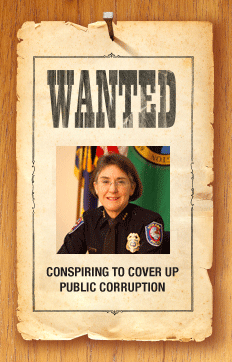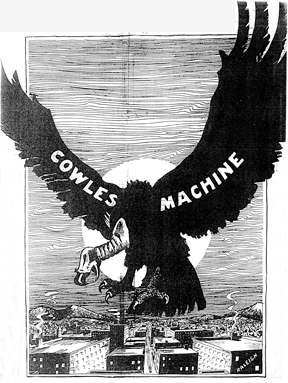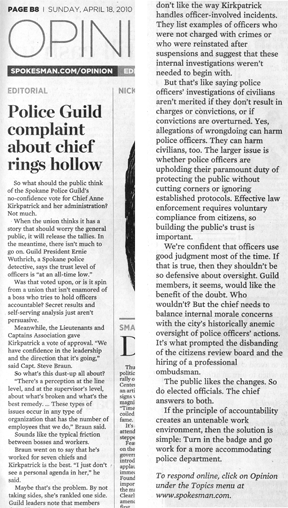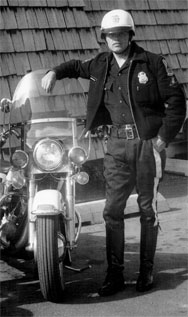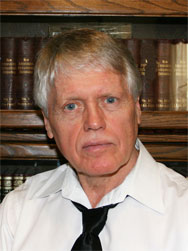Dear Donna McKereghan: This is the open public response I promised you regarding the Siddoway/Dunham race for a seat on the Division III, District I Washington Court of Appeals.
First a caveat: this is ridiculously long. My charges are serious; I have erred on the side of documentation and repetition.
Second, let me establish a context for the benefit of those just now joining a discussion that you and I began in email. As you know, I believe that Judge Laurel Siddoway epitomizes the public corruption and organized crime that produced the River Park Square scandal and killed Jo Ellen Savage in the RPS parking garage. I said as much in a July 29, 2010, email to retired economic crimes detective Ron Wright. I was responding to an email Det. Wright sent me that day concerning the endorsement of Judge Siddoway’s reelection bid by The Spokesman-Review. I’m going to elaborate in what follows on my judgment of Judge Siddoway and her opponent, Judge Harvey Dunham. I judge them both because they ask me to: they’re candidates for public office.
EXECUTIVE SUMMARY: I wish the Siddoway/Dunham race were a simple choice between established competent corruption, which is how I see Judge Siddoway, and possibly incompetent decency. Unfortunately, based on the conduct of people associated with Judge Dunham’s campaign, I worry about his ethics.
Here We Go
Okay, here’s my email to Det. Wright.
(Those who have already read these emails might want to just skip down to the interior headline Judicial Parable.)
“Det. Wright: Laurel Siddoway was the public’s lawyer when she served Mayor John Powers as RPS special counsel. In that capacity, she and Mayor Powers dropped the civil conspiracy charges brought against the RPS developer and various public officials by Mayor John Talbott and his RPS special counsel, O. Yale Lewis. Neither Ms. Siddoway nor Mayor Powers ever explained why they dropped those charges. As the RPS municipal securities fraud litigation progressed, discovery produced overwhelming evidence that there was indeed a conspiracy between the developer and public officials to commit securities fraud; to, as Mr. Lewis alleged, ‘improperly divert public money for private purpose.’ The RPS plaintiffs documented this evidence in their 91-point Omnibus Statement of Facts.” (See ‘Fraudville, USA’ at http://www.camasmagazine.com/articles/viewArticle.asp?aid=179.)
“Based on Ms. Siddoway’s recommendation, the City of Spokane settled with the plaintiffs by purchasing their case. That case proved the existence of the fraudulent conspiracy that Ms. Siddoway said didn’t exist. The purchase of that case cost Spokane’s citizens $44.8 million. Ms. Siddoway, in other words, contradicted herself as precisely as possible. The result of her contradiction suggests that Ms. Siddoway willingly and knowingly became a central agent in perfecting the RPS fraud against the public. (See ‘A New RPS Fraud?’ at http://www.camasmagazine.com/articles/viewArticle.asp?aid=199.)
“The facts, then, show that Ms. Siddoway did not represent the public when she was paid by the public to be the public’s lawyer. She represented the perpetrators of the RPS fraud. The key perpetrator of that fraud, of course, was the RPS developer, Betsy Cowles. It isn’t surprising that Ms. Cowles’s newspaper would endorse Ms. Siddoway as an appellate court judge. This preserves the Cowles family’s influence over a judiciary the corruption and/or incompetence of which enabled the RPS fraud. Remember that Spokane Superior Court Judges Kathleen O’Connor and Sam Cozza refused to let Spokane’s citizens vote on the RPS ‘public/private partnership.’ Remember that the evidence suggested from the beginning that this project was fraudulent, which is why Spokane’s citizens wanted to vote on it. Remember that Ms. Siddoway ultimately agreed that the project was fraudulent by recommending the city purchase the evidence proving that it was. Remember the city agreed with Ms. Siddoway by taking her advice.
“Of course Ms. Siddoway will be the perfect appellate court judge to protect the Cowles family’s provably criminal conduct. But there is no reason to believe that Judge Siddoway will interpret the law in a way to protect the public from this continuing criminal enterprise. When Spokane Mayor Mary Verner refers to Spokane’s ‘powers that be,’ this is the organized criminal enterprise she appears to be referring to. Please see ‘America’s Most Dangerous Cop’ at [this website].
“Anyone running against Ms. Siddoway for this office who is not willing or able to review and explain this evidence to the electorate is probably no more willing or able to represent the electorate, or uphold the law, than could be expected of Judge Siddoway. Obviously, this statement also applies to every other elected official and candidate for public office in Spokane. You can’t serve two masters. In Spokane you can serve the organized criminal enterprise of the Cowles family or you can serve the public upon which that enterprise preys…”
Tempest in a Teapot
As you know, Det. Wright then sent that email to Michael McMillin. Mr. McMillin is campaign manager for Judge Harvey Dunham, Judge Siddoway’s opponent.
“Det. Wright,” wrote Mr. McMillin, “I appreciate this information, unfortunately there is nothing much we can do with it. If this information were to be released by someone outside of the campaign, there is nothing we can do to stop that. Although, under the Judicial Canons, both Harvey and myself cannot partake in any mudslinging. Judicial candidates and their campaigns must hold the highest ethical standards when running for office. It is the job of the people and supporters to get the word out. Thanks again, we appreciate both the information and the support. It is vital that we get a moral and ethical man into office and replace the Gregoire appointee/ACLU Board of Directors member.”
That email ended with boilerplate saying that it “may contain legally privileged and/or confidential information” and not to send it around without Mr. McMillin’s permission, and that if you received it by mistake to permanently delete it.
Det. Wright ignored the boilerplate. He sent Mr. McMillin’s email to me. I responded:
“Det. Wright: Mr. McMillin’s response to evidence of Laurel Siddoway’s unethical and possibly illegal conduct strikes me as evasive and cowardly. If Judicial Canons prohibit discussion of evidence of unethical and perhaps illegal conduct by candidates for judicial office, that, in itself, makes the canons a farce, it seems to me. And that, in turn, condemns the judiciary to sophistry and the mockery of justice. These are the very qualities, the evidence proves, that are the hallmarks of the RPS project and Laurel Siddoway’s role in it. ‘It is vital that we get a moral and ethical man into office and replace the Gregoire appointee/ACLU Board of Directors member,’ Mr. McMillin concludes, after admonishing you that Judge Dunham’s campaign is barred by canon from engaging in mudslinging. Sigh. How is one to respect the integrity of a candidacy like that? As you know, my view is that the American experiment in democracy now faces a historical threat from its own rampant corruption and moral failure. This moral failure, in my view, is more dangerous to this nation than terrorists can ever be. I don’t think America’s biggest problem is the impurity of any political ideology, as Mr. McMillin and his candidate appear to believe. I think its biggest problem is plain old fashioned immorality. I’ll take an honest conservative over a corrupt liberal, and vice versa, any day.”
I ended that email with the note that I was copying it widely, because I considered its subject—a judicial race—a matter of public interest. I said folks were free to distribute my comments as they chose. Folks did. My email put a fork in a few fillings, beginning with Mr. McMillin.
Mr. McMillin fired back at me:
“Mr. Shook, I am glad that you can cc a whole host of people and disregard the message at the bottom of my email. I considered my email to Det. Wright a private email, but appreciate your complete disregard for my wish. I find it odd, that someone with your will to gain credibility would so willingly attack another person before having a discussion with them about intent first. I sir, have read your articles and found interest, yet wonder at the sheer accuracy of them when responding to a private email in such a rash and unprofessional way. I fear that we have lost the function of debate when a person is willing to run to the public to attempt to bolster their own ratings every chance they get. I fear we should have never responded, as I am sure your attempt is to publicize your website… sigh.
“If you would ever like to sit down and meet with me about how cowardly I truly am, feel free to contact me. Thank you for both your ignorance, and proof of the reason why I told Dave Stevens that we should avoid contact. And thank you sir, as I can see you are obviously the mudslinger here and I will not be talking with you any further. Oh, and one last thank you for your disregard for the ethical conduct of judicial candidates.
“Judicial Canon (7)(B)
(B) Campaign Conduct.
(1) Candidates, including an incumbent judge, for a judicial office;
(a) should maintain the dignity appropriate to judicial office, and should encourage members of their families to adhere to the same standards of political conduct that apply to them;
(b) should prohibit public officials or employees subject to their direction or control from doing for them what they are prohibited from doing under this canon; and except to the extent authorized under Canon 7(B)(2) or (B)(3), they should not allow any other person to do for them what they are prohibited from doing under this canon;
(c) should not
(i) make pledges or promises of conduct in office other than the faithful and impartial performance of the duties of the office;
(ii) make statements that commit or appear to commit the candidate with respect to cases, controversies or issues that are likely to come before the court; or
(iii) knowingly misrepresent the identity, qualifications, present position or other fact concerning the candidate or an opponent.
“We will not be partaking in this discussion or your misrepresentation of any candidate in this race any further. Thank you.”
With that, the teapot containing this little tempest began to merrily boil. I show some 39 emails in this string. Including other emails in related strings, it looks to me as though I may have received around 100 responses. Yours was one of them.
The Ethicist Objects
In an effort to confine the bloat of this already bloated blog, I’m not going to include your entire email. I link it here for those who want to read all of it. And I commend it to all. As I told you by return email, I deeply appreciated your reply. I found it generous, thoughtful, reasonable, and gutsy.
You criticized my comments to Det. Wright thus:
“So, unless or until an attorney or judge is found in violation of the codes or of illegal conduct, the opponent’s campaign IS NOT ALLOWED to comment on the matter and for good reasons, reasons that the public has called for, demanded and which were put into place at the behest of the public and with overwhelming public support. And now someone’s response is called evasive and cowardly for obeying those codes and laws? Someone who has cried out so loud and clear for us all that the laws have not and are not being upheld? You cannot reasonably call for adherence to law and, in the next breath, criticize those who obey it. I am very disappointed by the contradiction.”
The Devil and the Deep Blue Sea
Ethical canons, as you know, allow for a veritable devil’s brew of loose-cannon behavior. Jesus is pretty clear, for instance, about the importance of not leading children astray. (Matthew 18:6.) And yet, as countless blood-curdling lawsuits now show, that admonition somehow escaped canonically bound pedophile Catholic priests who have been preying on their own lambs for decades. And even now the Catholic canonical jefe, Pope Benedict XVI, is casual enough about this tragedy to have been accorded a recent Time magazine cover line: “Why Being Pope Means Never Having to Say You’re Sorry.”
I don’t dispute the need for ethical canons. I just don’t think they mean anything if there’s no consequence for violating them. There has been no meaningful consequence within the Catholic Church for the systematic sexual abuse of children. Similarly, so far there has been no meaningful consequence within the legal establishment for the systematic violation of law and ethics that lie at the heart of the RPS scandal.
“Now IF someone has been FOUND to have violated the ethics codes by the body which has jurisdication, that’s a different matter,” you write. The Catch 22 contained in this proviso is precisely the point regarding the crimes of River Park Square, including the death of Jo Ellen Savage in the RPS garage.
In this country what happens if the President of the United States, a U.S. Attorney General, the director of the FBI, etc. violate the law and, as the highest authorities in the land, choose not to enforce the law upon themselves? Is that the end of it? Of course not. And yet that is exactly what has happened with the RPS scandal. The evidence of criminal acts, keep in mind, comes from the IRS, a federal lawsuit, voluminous sworn testimony. The law, so far, simply has not been enforced.
Retired Spokane Police Detective Captain Robert Allen once contacted me about this after studying Camas’s reporting. He was concerned about the impact of the RPS losses on Spokane’s police budget. He told me he was appalled that, in the face of such evidence, no criminal investigation had been conducted.
That’s how blatant the evidence of crime and no punishment is in the RPS affair. Capt. Allen is also a retired attorney, a 30-year member of the Washington Bar.
The conduct of Laurel Siddoway, in my opinion, makes her the perfect symbol of this chilling legal, moral and ethical failure. Supporters of her opponent, Judge Dunham, appear to agree. You have provided me with a flyer they have circulated titled “Stop Insidious Siddoway.” In it they cite my reporting as evidence of her insidiousness. In other words, the evidence contained in my reporting is the reason they believe Judge Dunham is more fit for office than Judge Siddoway. And yet they attack Judge Siddoway not for her conduct, but for her membership in the American Civil Liberties Union?
That is what I objected to as cowardly and evasive. Those words may be too harsh. I don’t get to have the last word on that. You and others do, and I respect your conclusions.
I’m no lawyer, and I could be missing something, but I see no support for Mr. McMillin’s tactics in the Judicial Canon excerpt he cites. I also don’t see a prohibition of discussing Judge Siddoway’s record, as the “Insidious Siddoway” flyer urges other people to do. Far from seizing the moral high ground on this subject, Mr. McMillin, in my view, has attempted to dig a foxhole for himself and his candidate in muddy ground.
The factual record of River Park Square—it was produced by the best legal work that money can buy—suggests to me that it was a crime committed by lawyers with the active complicity of judges all the way up to the state supreme court. Because of that, I’m no more willing to confine the discussion of judicial morality to judges than I think Catholics should be to let their priests have the last word, say, in interpreting Matthew 18:6.
“Pretty is as pretty does,” my mother used to say. Being a judge or a priest doesn’t make you right or excuse you from obeying the law.
As to Mr. McMillin’s charge that my distribution of his email violated his right to confidentiality, I disagree. You can’t burden me with an unethical secret I didn’t ask you to share and expect me to keep your secret. So I don’t concede that I owed Mr. McMillin the duty of confidentiality he claims. I don’t think Det. Wright did either. I’m an investigative reporter, for Pete’s sake. Wright’s a veteran criminal investigator.
Politics is often dirty. It’s full of bribes, lies, kickbacks, slush funds, money laundries, and assaults of every kind on the public interest. Any government of human beings is inherently vulnerable to corruption. That’s why Thomas Jefferson said he would prefer newspapers without government to government without newspapers. Criminal government—it’s called tyranny—is the most serious crime there is.
So what if Mr. McMillin had shared a dirty political strategy in his email? Or what if it had merely engaged in some kind of slur against Judge Siddoway? I actually think he came close by impugning her morality and ethics based on her support of the ACLU. I thought of Sen. Joseph McCarthy calling Gen. George Marshall a Communist when I read the ACLU cheap shot. Mr. McMillin’s wording might also be interpreted as impugning the gender of both Judge Siddoway and the governor who appointed her.
As Dr. Phil might ask Mr. McMillin, What were you thinking!?
Still, that critique of Mr. McMillin’s email doesn’t really get at the heart of my reaction. It makes it sound more academic than it really is.
Another of Judge Dunham’s supporters recently criticized The Spokesman-Review’s coverage of the Siddoway campaign because, “… you didn’t mention that Ms. Siddoway was a board member of the ACLU and endorsed by the Gay Lesbian Bisexual and Transgender Bar Association of Washington as highly qualified.”
The simple truth is that kind of talk hurts me. I have many friends who are gay and lesbian. I have friends whose children are gay and lesbian. My children aren’t gay or lesbian, but I would love them just as much if they were. My children do have gay and lesbian friends, and their friends are my friends. Are Judge Dunham’s supporters sending code to the electorate endorsing judicial prejudice against gay people?
To come to grips with how hurtful this kind of thing is, Judge Dunham and his supporters might want to look at this poignant YouTube objection to perceived gay bashing by Target Stores: http://www.youtube.com/watch?v=2SipXbgyi68. I think this kind of thing is bad ethics, bad manners, bad business, bad politics—just plain wrong.
Another thing. I served in Vietnam with African Americans, Hispanic Americans, Asian Americans, Native Americans, Christian Americans, Atheist Americans, Jewish Americans, etc. Uncle Sam drafted us all. Lots of people, I know, don’t like the ACLU because of its famously nitpicky defense of the civil liberties of minorities. But an American judge is required by law to enforce the rights of all people.
If you want to know how “bad” the ACLU can be, check out the Tim Disney movie, American Violet. It’s based on the true story of Regina Kelly.
What do I care if Laurel Siddoway is a member of the Gay and Lesbian Composers of Atonal Jazz for Poetry Slams and the Legalization of Marijuana? It’s her record that concerns me. Because of her record, I will not vote for her. In offering me an alternative, I wish Judge Dunham would make it clear that he’s not winking me the message that he intends to sneak ugly prejudices onto the bench.
You say Spokesman-Review publisher Stacey Cowles is “operating under the spotlight of a reputation he didn’t earn but that, because of his name, has become his legacy.” That’s a polite suggestion. I admire the kindness of your instinct in making it. Unfortunately, it’s inconsistent with the evidence. Please see “American Serbia” and track the documentation.
If Mr. Cowles’s reputation is that of a newspaper publisher who uses his paper, and his editorial staff, to commit crimes—crimes that end up killing innocents and destroying the careers of the honest—believe me he deserves it.
Your statement that you know of no Spokesman-Review reporters who have “criticized the paper for it being beholden to the Cowles family” also doesn’t square with my reporting. Please see “All In the Family” on the Camas site. Pay particular attention to the comments of former Cowles city hall reporter Oliver Staley. See also reference to the Harvard economics thesis about the noxious Cowles media influence in Spokane in the story, “A Newspaper Monopoly Town,” http://www.girlfromhotsprings.com/news-monopoly.html.
Taking a paycheck from an organization the proven conduct of which satisfies the legal definition of organized crime and then keeping your mouth shut about the evidence doesn’t satisfy any code of ethics I know of.
Unless, of course, the code of ethics was written by Councilman Al French. You note that Mr. French was a key author of the Spokane City Council’s current code of ethics. Oh, oh.
Councilman French rubber-stamped the corrupt settlement of the RPS securities fraud case. (See below.) He said he felt like, “I have a gun to my head.”
This was a bit of play-acting. The gun was supposed to be Betsy Cowles’s threat of bankrupting her River Park Square mall if the city tried to make her return the public money that public officials helped her steal to “save downtown.” In this little drama, Ms. Cowles played the role of a bank robber. The city, acting on the legal advice of Ms. Siddoway and various co-conspirators in the RPS fraud, played the role of the bank’s owners.
Bank Robber: I will not return all the money I stole from you. I’ll give you back just a little bit. If you keep arguing about this I’m going to declare bankruptcy and you’ll get nothing.
Bank Owners: Well, okay. But this is SO unfair!
We know this is an accurate scenario, because when Betsy Cowles tried the same dodge in federal bankruptcy court after former RPS manager Bob Robideaux sued her for contract violation, the court slapped Ms. Cowles’s real estate companies with bad-faith filing penalties. That cost the Cowles mob nearly $10 million. Ms. Cowles’s newspaper to this day refuses to report the full amount of what the gun-to-the-head-of-the-victim strategy cost her that time. (Owning a newspaper means never having to say you’re sorry in public.) One obvious reason Ms. Cowles’s attempted stick-up of Mr. Robideaux failed is that Mr. Robideaux had Bob Dunn as his attorney, not Laurel Siddoway. Smart move, Mr. Robideaux.
Anyway (here’s the tedious repetition), the evidence shows that the RPS deal was a symphony of lies from the beginning. Thanks to Laurel Siddoway, it ended in one of the dirtiest lies of all. And Mr. French helped Ms. Siddoway get away with it. And now you tell me that Mr. French gets the credit for drafting the city’s current code of ethics. Dear oh dear.
To paraphrase my mother: ethical is as ethical does.
Now consider that the mob’s newspaper, The Spokesman-Review, is endorsing Mr. French to replace Spokane County Commissioner Bonnie Mager. The bank robber endorsing gang members for public office? Dear oh dear oh dear. What are we coming to?
The evidence of Cowles family corruption contained at www.camasmagazine.com, www.girlfromhotsprings.com, and on this Web site is so overwhelming that it’s reasonable, in my view, to suspect any candidate for any office who enjoys the political endorsement of Cowles media. Were I a political candidate intent on serving the public, the last thing I would want is the endorsement that the Cowles newspaper has hung on Judge Siddoway. Still, you have to love the poetic justice.
Judicial Parable
In the Biblical judicial parable, the answerer of a question condemns himself with his own words. For me, Judge Siddoway’s RPS record makes her like the character in a judicial parable whose mistake supplies the moral.
Here is a direct quote from the transcript of a hearing in the RPS securities fraud case before U.S. District Court Judge Edward F. Shea on February 23, 2005.
THE COURT: I seem to be missing something. How can a 26 million dollar garage in 1998 be worth 3.4 million dollars in 2004?
MS. SIDDOWAY: It was never worth 26 million dollars.
Bingo. It was never worth $26 million. Reason: the very securities fraud Ms. Siddoway was attempting to defend.
Read Item #14 on page six of Judge Siddoway’s Judicial Evaluation Questionnaire. It’s her description of her handling of the RPS litigation. It sounds as though she’s describing an act of God instead of a disaster created by affirmative fraudulent acts against the public committed by the corrupt officials she was trying to protect.
Read her answer to Question 38 on page 16. It’s her explanation of why Councilwoman Rodgers filed bar complaints against her. Judge Siddoway explains that Councilwoman Rodgers, “was unhappy with me because I would not pursue a conspiracy claim in the River Park Square litigation that I did not believe was supported by evidence.”
If Ms. Siddoway didn’t believe the evidence of conspiracy, how come she ultimately recommended purchasing the voluminous conspiracy evidence contained in the bondholders’ Omnibus Statement of facts? Remember what that cost Spokane’s citizens: $44.8 million.
Of course that evidence existed. It was always there. It’s just that Ms. Siddoway and the three corrupt mayors she served tried to sweep it under the rug. It wasn’t just evidence of conspiracy. It was evidence that satisfied the legal definition of organized crime. Evidence that supported bringing charges under RICO, the federal law created to destroy organized crime. All that evidence made the rug Ms. Siddoway was standing on resemble Himalayan foothills. As Ms. Siddoway and the public conspirators she was shielding were being dragged into the RPS trial you could hardly see their heads above the folds in that comical rug. That’s why they settled. (See, among other stories, “Fraudville, USA,” “The Mayor’s Confession,” and “A New RPS Fraud?” on the Camas site.)
Of course the evidence of the RPS fraud was there all along. That’s why, in the summer of 2004, the IRS issued its devastating findings about the sale of the RPS garage bonds. “It is clear from the facts of this case, the developer [read: Cowles Mob] had, and continues to have, a particular relationship with the City of Spokane… such that it was in a position to control or influence its activities,” wrote the IRS. (See “The Casino Was Rigged” on the Camas site.)
Evidence of that control is also evidence of the conspiracy and organized crime that Laurel Siddoway spent most of the first decade of the new millennium trying to cover up.
As several of the nation’s most prestigious financial institutions and the nation’s tax collector found, the evidence is simply overwhelming that the RPS fraud was the direct result of a conspiracy between the RPS developer and an incredible cast of public officials—mayors, city council members, city lawyers, the ostensibly public agency that was to manage the RPS garage “on behalf” of the public, the city’s own bond counsel… It’s quite a lineup. The Camas reporting cited by the “Insidious Siddoway” flyer offers abundant proof of that conspiracy.
Quick RPS synopsis.
When John Powers defeated John Talbott in the 2000 mayoral race, the first thing Powers did was fire RPS special counsel O. Yale Lewis and replace him with Siddoway, one of his top campaign contributors. By then, the fraudulently appraised and fraudulently financed RPS garage was headed for bankruptcy. That would spell fiscal disaster for Spokane. To protect Spokane’s citizens, Talbott and Lewis had filed papers with the court showing they intended to prove that the developer and public officials had conspired to commit the fraud that was leading to the bankruptcy.
The first thing Team Powers/Siddoway did was drop the Talbott/Lewis conspiracy charges. This was reported by Tim Connor in a March 8,2001, Camas story called “Powers Play.” http://www.camasmagazine.com/articles/viewArticle.asp?aid=61.
Reported Connor: “Councilwoman Cherie Rodgers says Siddoway told her the conspiracy charges were dropped for political reasons.
“‘If that’s what she heard,’ Siddoway said about Rodgers’s statement, ‘That’s not what I thought I said.’ But then Siddoway quickly added that she thought it was ‘very destructive of settlement negotiations’ and ‘of the political atmosphere generally to be making those kinds of allegations without much evidence that they’re fair.’”
But there was already plenty of evidence they were fair.
For one thing, there was the embarrassing front-page January 9, 1999, Wall Street Journal story showing that a critical memo from city attorneys Jim Sloane and Stan Schwartz warning of a dangerous aspect of RPS’s financing had been covered up by both the city and the RPS developer. (See, among other Camas stories, “All in the Family,” http://www.camasmagazine.com/articles/viewArticle.asp?aid=65.)
For another thing, there was the hidden crisis of AMC in the summer of 1999. As Camas reported in “Under The Influence,” in the summer of 1999, AMC Theaters, the second anchor tenant in the RPS mall behind Nordstrom, notified the developer and public officials that its customers weren’t going to pay to park in the RPS garage. That was bad news, because nearly half the money needed to pay off the RPS garage bonds was to come from AMC. Under federal securities law, this development was a “material fact.” Bond purchasers had to be told of it. But developer Betsy Cowles wanted it kept a secret. She wanted the law broken. She asked public officials, including Spokane city council members and the city’s bond counsel, to keep her secret, and they obeyed. Cowles even asked the lawyer who was supposed to protect the bond purchasers to sign a confidentiality agreement. He did. It was about as naked an act of a conspiracy to defraud as there could be. (See http://www.camasmagazine.com/articles/viewArticle.asp?aid=70.)
Former Spokane City Councilwoman Cherie Rodgers has long suspected Siddoway of having personal knowledge of the AMC crisis long before she became the city’s RPS special counsel. That knowledge, if Ms. Siddoway really had it, Ms. Rodgers believes gave Ms. Siddoway an ethical conflict of interest that should have prevented her from ever representing the citizens of Spokane in the RPS scandal.
As Camas quoted Councilwoman Rodgers in “The Case of the Invisible Client” (http://www.camasmagazine.com/articles/viewArticle.asp?aid=109), Ms. Siddoway “‘had also represented AMC when AMC was thinking of backing out of the deal [in 1999], so I think she was also trying to protect the who’s who in the downtown group that backed this and supported it from day one,’ says Rodgers.”
Ms. Siddoway denied those charges. She admitted, however, that AMC had paid her to do something in the fateful summer of 1999. Citing attorney/client privilege, she just wouldn’t say what. If, as part of her AMC assignment, Ms. Siddoway actually did learn of the AMC crisis before she took over as RPS special counsel, it could arguably make her a co-conspirator in the conspiracy she long denied.
After spending years and many millions of public dollars denying the RPS conspiracy, Ms. Siddoway effectively threw in the towel and admitted the conspiracy after all. One more time: she did that by recommending the city purchase the bondholders’ securities fraud case that proved the conspiracy. The $44.8 million that case cost Spokane’s citizens on the barrelhead doesn’t begin to touch the full fiscal ravages of the RPS fraud.
Even with that admission, however, Ms. Siddoway wasn’t done aiding and abetting those who had defrauded the public. She withheld from the city council legal advice intended to enable Spokane’s citizens to recover appropriately from the RPS developer. (See “A New RPS Fraud?” at http://www.camasmagazine.com/articles/viewArticle.asp?aid=199.)
Ms. Siddoway also spent years denying the city had violated the state’s public records act in assisting the RPS developer and public officials to defraud municipal bond purchasers and the citizens of Spokane. All that time she was sitting on evidence proving that she wasn’t telling the truth. In the end the city admitted its deceit. It settled the public records suit brought against it by Camas. The city apologized for lying. Laurel Siddoway never did.
“The city of Spokane acknowledges that it withheld as privileged in the River Park Square litigation documents that were not privileged,” read the apology that was part of the settlement. “This was a misuse of the attorney-client privilege and the Washington State public records act, and the city of Spokane deeply regrets it.”
But not deeply enough to pursue the public officials who systematically violated the law in order to help the RPS developer “improperly divert public money for private purpose.”
Proposed Resolution
Whereas the evidence that Laurel Siddoway successfully covered up when she was RPS special counsel is also evidence supporting prosecution of organized crime, and whereas there is no statute of limitations in the prosecution of organized crime, and whereas the current fiscal crisis of the City of Spokane can be directly tied to Siddoway’s tactics as RPS special counsel, be it therefore resolved that this is a big deal.
My Apology
I told you that I would reflect on the thoughtful email in which you criticized my message to Mr. McMillin. I told you I would publicly apologize if I concluded an apology is in order. I do. I apologize. But not for what I wrote. I apologize for its tone. It’s very unpleasant. The tone of this blog is probably worse. It’s just that the facts are so awful that I’m at a loss to find another tone. I truly am sorry.
“… there was a secret chord that David played and it pleased the Lord,” go the lyrics in the haunting Leonard Cohen ballad, Hallelujah. I love that song. My favorite rendition is the performance by the K.D. Lang at the 2005 Juno Awards in Winnipeg. There’s a desperate pleading in Ms. Lang’s voice that pierces my soul and makes me think of something a friend of mine says about God and water. “Thirst is the proof of water,” he says, “just as our yearning for God is proof there is one.”
I think the secret chord Cohen writes about is real. I think it has to do with honesty, but not mere honesty. Rather, I think the chord is heard only in honesty expressed in sweetness, honesty devoid of wrath. And I believe that the yearning for unity that many, but not all, call God is universal. Listen to Lang here http://www.youtube.com/watch?v=P_NpxTWbovE and see if don’t hear both the yearning and the chord.
Anyway, I heard in your email strains of the chord. It was sincere and courageous and devoid of wrath. I don’t have that chord down yet. I’m going to have to keep working at it. Thank you for your example.


